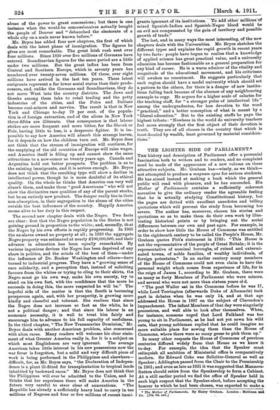THE LIGHTER SIDE OF PARLIAMENT.*
THE history and description of Parliament offer a perennial fascination both to writers and to readers, and no complaint need be made of the appearance of a new volume on these attractive subjects. Mr. Graham has—wisely, as we think— not attempted to produce a magnum. opus for serious students. He has aimed instead at making a book which the general public will read with pleasure, and he has succeeded. His Mother of Parliaments contains a sufficiently coherent narrative to give the ordinary reader the agreeable feeling that he is actually studying Constitutional history, but the pages are dotted with excellent anecdotes and telling quotations which will prevent the study from becoming too severe. The author has, moreover, chosen his stories and quotations so as to make them do their own work by illus- trating historical points or by bringing out the social differences between our own and past ages. For example, in order to show how little the House of Commons was entitled in the eighteenth century to be called the People's House, Mr. Graham quotes Pitt's statement in 1783: "This House is not the representative of the people of Great Britain ; it is the representative of nominal boroughs, of ruined and extermi- nated towns, of noble families, of wealthy individuals, of foreign potentates." In an earlier century many members of the House of Commons could not even claim to have the personal weight which comes from experience of life, for in the reign of James I., according to Mr. Graham, there were as many as forty Members of Parliament who were minors, and several who were not more than sixteen years ol d.
"The poet Waller sat in the Commons before he was 17, while Lord Torrington (afterwards Duke of Albemarle) took part in debates when he was only 14, and at that age addressed the House in 1667 on the subject of Clarendon's impeachment. The infant Members of that day were singularly precocious, and well able to look after themselves. When, for instance, someone urged that Lord Falkland was too young to sit in Parliament, as he had not yet sown his wild oats, that young nobleman replied that he could imagine no more suitable place for sowing them than the House of Commons, where there were so many geese to pick them up."
In many other respects the House of Commons of previous centuries differed widely from that House as we know it to-day. For example, the idea that the Speaker must relinquish all ambition of Ministerial office is comparatively modern. Sir Edward Coke was Solicitor-General as well as Speaker ; Addington passed from the Chair to the Premiership in 1801; and even as late as 1831 it was suggested that Manners. Sutton should retire from the Speakership to form a Cabinet. At a still earlier period we find the office of Speaker held in such high respect that the Speaker-elect, before accepting the honour to which he had been chosen, was expected to make a • The Mother of Parliaments. By Harry Graham. London, Methuen and Co. [10s. 6d. net.]
long speech "disabling" himself in the humblest possible terms, and urging that some more suitable person should be eelected. After this exercise in self-depreciation the Speaker- elect had to remain seated in his own place until he had been forcibly dragged out of it by two of his supporters, and he was expected to continue to offer a show of resistance to them until be had actually reached the Speaker's Chair. To-day this ancient parade of mock modesty is represented by the custom which requires the Speaker-elect to be courteously conducted to the Chair by his proposer and seconder. In other respects modern common-sense refuses to tolerate the arti- ficiality which seems to have given so much pleasure to our ancestors ; but at no period has the English House of Commons had much tolerance for any extravagant or melodramatic -demonstration of passion or emotion. When Burke, in 1792, on the second reading of the Aliens Bill, suddenly produced a French dagger and flung it upon the floor to point his argument, the House only laughed. An even more complete failure to bring off a carefully planned piece of acting is described by Mr. Graham. On the second reading of the Reform Bill, Lord Brougham spoke for four hours, fortified by frequent draughts of mulled port. At the end he exclaimed : "I solemnly adjure you, on my bended knees I supplicate you, reject not this Bill." Suiting the action to the word, he fell upon his knees, but according to Mr. Graham's version, remained kneeling so long that his friends, fearing that be was suffering from mulled port as much as from emotion, picked him up and replaced him on the Woolsack. Mr. Graham does not give his authority for this story ; we have heard it before, but also heard it denied. Brougham's friends were wont, we believe, to point to the report in the Times, which added as a note to the peroration, "At these words the Chancellor slightly bent his knees to the Woolsack:' It may be added that the book is further brightened by a score of excellent illustrations.











































 Previous page
Previous page